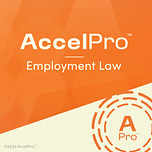Welcome to AccelPro Employment Law, where we provide interviews and products to accelerate your professional development. Today we’re featuring a conversation about cannabis and the workplace. Our guest is Narcisa Przulj, a partner at Sandberg Phoenix who counsels employers as they wrestle with these changing laws.
Cannabis law is an emerging field in employment law. Marijuana is now legal for recreational use in more than 20 states, and that number will continue to grow.
Employers face the complicated proposition that a substance that was illegal throughout our country’s history is now legal. What does that mean for the workplace? Should employers test for it in states where recreational use is legal? What does the law say about jobs with safety concerns?
Przulj explains the perils of testing, the mitigating factors of safety and government contracts, and the importance of having consistent policies. The episode transcript and supplemental materials are available below.
AccelPro’s expert interviews and coaching accelerate your professional development. Join AccelPro Employment Law now for a free trial of everything we offer to members.
Interview References:
Narcisa Przulj’s Sandberg Phoenix profile.
1:14 | Missouri Right to Access Medical Marijuana, RSMo XIV Section 1, RSMo XIV Section 2 (2022).
11:43 | Illinois Cannabis Regulation and Tax Act, 410 ILCS 705 (2020).
Supplemental Materials:
Baugher, David. (2019, August 15). Narcisa Przulij, Sandberg Phoenix. Missouri Lawyers Media.
TRANSCRIPT
I. AN EMERGING AND CHANGING FIELD
Matt Crossman, Host: My first question is about what we should call what we’re going to talk about. You call it cannabis law and not pot law, weed law or marijuana law. Is that purely semantics or is there a reason for calling it that?
Narcisa Przulj: There’s absolutely a reason, and I’m glad you asked. When I first got into this area of the law, I noticed both the use of the word cannabis, which I wasn’t familiar with, and also a bit of a push for it. There are a number of reasons for this.
Cannabis is the actual name of the plant. When medical use of marijuana first became legalized, there was a push to get away from all of the ideas that we have about pot or weed and start talking about the plant so that we can focus on the benefits of that medical usage.
And then there’s also the history of the word marijuana. In the 20th century, it invoked a bit of fear mongering. There was a lot of rhetoric around the prohibition of marijuana. And so I just decided that cannabis was a good word to use if I was going to be in the space.
MC: You’ve given a lot of talks on this, and I love the title —“Up in Smoke”— that cracked me up. You told me your talks are always sold out. That speaks to the interest in this topic. I imagine you get a lot of questions at these events. What kind of questions do you get from clients and perspective clients?
NP: I always open these presentations with, “Can you even believe we’re here?” Because five years ago, I would not have believed I’d be talking about this. So I would say that I think we’re all—clients and practitioners included—just trying to catch up and understand the times and then wrap our heads around it, which I’ve been doing for the last five years.
I think clients have concerns over understanding the law because there are a lot of confusing parts to it. There are a lot of questions about drug testing. Should we be testing for cannabis right now?
It brings up the broader conversation, too: What drugs should we be testing for, if at all? And then there’s also a lot of concerns about the differences between safety-sensitive positions and somebody sitting at a desk.
There are a lot of questions, probably more than in anything I’ve dealt with. And it’s one of the first times in my career that I’ve truly nerded out. Because there are so many different issues.
—
II. THE LEGAL MINEFIELD OF TESTING
MC: In your talks, you note several cautions about testing for employers. The first is who they give the tests to. Explain your concerns there and the advice that you give to employees on this issue.
NP: Absolutely. While it is legal if you’re over the age of 21 to privately consume cannabis and related products, employers can prohibit employees from reporting to work under the influence and from using cannabis at work or during work time. That’s where we start.
The first issue is who do you give these tests to? That has to do with making sure you have a clear policy on how you’re testing and making sure that you’re not letting individual supervisors make decisions: One supervisor doesn’t care about it at all and doesn’t test anyone ever, while another supervisor is terrified of people smoking pot and coming to work high and starts testing everyone.
I like to use this example: I was surprised to find out that there are moms at my kid’s middle school who are white, upper middle class, and they happen to use cannabis for one reason or another. So you might not be thinking about testing moms. On the other hand, are you going to be targeting your African-American men and women or young people, say, 25-year-olds?
There’s so much involved in how we were socialized about drugs, myself included. And of course there’s the issue of historical drug laws disproportionately affecting minorities and people of color. This could become a really serious issue at work if people aren’t paying attention.
MC: Is the way to avoid that to be consistent, either one way or another? Either be stringent or not stringent and don’t treat the people who work on the dock, if I may use a stereotype, differently than the people who work in accounting.
Listen to this episode with a 7-day free trial
Subscribe to AccelPro | Employment & Labor Law to listen to this post and get 7 days of free access to the full post archives.












